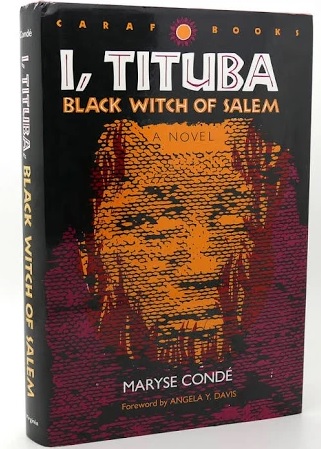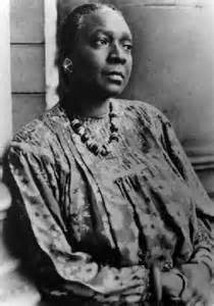I, Tituba: Black Witch Of Salem by Maryse Conde. Charlottesville. 1992. University Press Of Virginia. Translated from the French by Richard Philcox. Foreword by Angela Y. Davis. 227 pages. 0813913985.
 FROM THE PUBLISHER -
FROM THE PUBLISHER -

This wild and entertaining novel expands on the true story of the West Indian slave Tituba, who was accused of witchcraft in Salem, Massachusetts, arrested in 1692, and forgotten in jail until the general amnesty for witches two years later. Maryse Condé brings Tituba out of historical silence and creates for her a fictional childhood, adolescence, and old age. She turns her into what she calls 'a sort of female hero, an epic heroine, like the legendary 'Nanny of the maroons,' who, schooled in the sorcery and magical ritual of obeah, is arrested for healing members of the family that owns her.
 Maryse Condé (born February 11, 1937) is a Guadeloupean, French-language author of historical fiction, best known for her novel Segu (1984–1985). Born as Maryse Boucolon at Pointe-à-Pitre, Guadeloupe, she was the youngest of eight children. After having graduated from high school, she was sent to Lycée Fénelon and Sorbonne in Paris, where she majored in English. In 1959, she married Mamadou Condé, a Guinean actor. After graduating, she taught in Guinea, Ghana and Senegal. In 1981, she divorced, but the following year married Richard Philcox, English language translator of most of her novels. In addition to her writings, Condé had a distinguished academic career. In 2004 she retired from Columbia University as Professor Emerita of French. She had previously taught at the University of California, Berkeley, UCLA, the Sorbonne, The University of Virginia, and the University of Nanterre. Condé's novels explore racial, gender and cultural issues in a variety of historical eras and locales, including the Salem witch trials in I, Tituba: Black Witch of Salem (1992) and the 19th-century Bambara Empire of Mali in Segu (1987). Her novels trace the relationships between African peoples and the diaspora, especially the Caribbean. She has taken considerable distance from most Caribbean literary movements, such as Negritude and Creolité, and has often focused on topics with strong feminist concerns. A radical activist in her work as well as in her personal life, Condé has admitted: ‘I could not write anything... unless it has a certain political significance. I have nothing else to offer that remains important.’ Her recent writings have become increasingly autobiographical, such as Memories of My Childhood and Victoire, a biography of her grandmother. Who Slashed Celanire's Throat also shows traces of Condé's paternal great-grandmother.
Maryse Condé (born February 11, 1937) is a Guadeloupean, French-language author of historical fiction, best known for her novel Segu (1984–1985). Born as Maryse Boucolon at Pointe-à-Pitre, Guadeloupe, she was the youngest of eight children. After having graduated from high school, she was sent to Lycée Fénelon and Sorbonne in Paris, where she majored in English. In 1959, she married Mamadou Condé, a Guinean actor. After graduating, she taught in Guinea, Ghana and Senegal. In 1981, she divorced, but the following year married Richard Philcox, English language translator of most of her novels. In addition to her writings, Condé had a distinguished academic career. In 2004 she retired from Columbia University as Professor Emerita of French. She had previously taught at the University of California, Berkeley, UCLA, the Sorbonne, The University of Virginia, and the University of Nanterre. Condé's novels explore racial, gender and cultural issues in a variety of historical eras and locales, including the Salem witch trials in I, Tituba: Black Witch of Salem (1992) and the 19th-century Bambara Empire of Mali in Segu (1987). Her novels trace the relationships between African peoples and the diaspora, especially the Caribbean. She has taken considerable distance from most Caribbean literary movements, such as Negritude and Creolité, and has often focused on topics with strong feminist concerns. A radical activist in her work as well as in her personal life, Condé has admitted: ‘I could not write anything... unless it has a certain political significance. I have nothing else to offer that remains important.’ Her recent writings have become increasingly autobiographical, such as Memories of My Childhood and Victoire, a biography of her grandmother. Who Slashed Celanire's Throat also shows traces of Condé's paternal great-grandmother.